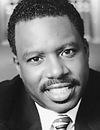Evangelical Rainbow Attack
Kathryn Joyce: Eight pastors -- four white, three black and one latino; representing various theological and political backgrounds and church types; all of them evangelical -- walk into a bar. Make that a hotel room near Chicago's O'Hare airport. It's not the set-up for a joke, but for something that's becoming about as regimented: religion reporting that tries so hard to avoid stereotyping evangelicals as Falwell-esque culture warriors that it ends up inadvertently relaying a new PR line for a post-Falwell era.
How the press remakes evangelicaldom for a post-Falwell age.
By Kathryn Joyce
 |
Eight pastors — four white, three black and one latino; representing various theological and political backgrounds and church types; all of them evangelical — walk into a bar. Make that a hotel room near Chicago’s O’Hare airport. It’s not the set-up for a joke, but for something that’s becoming about as regimented: religion reporting that tries so hard to avoid stereotyping evangelicals as Falwell-esque culture warriors that it ends up inadvertently relaying a new PR line for a post-Falwell era: evangelicals are racially and politically diverse and they’d like to be known for more than opposition to abortion and gay marriage. Transcending stereotypes is of course a worthy aim, and it’s attempted again in Cathleen Falsani’s ambitious three-part series for The Chicago Sun-Times, “Evangelicals: Beyond the Label,” which strives to show the diversity of American evangelical culture through the microcosm of Chicago-area churches. But though Falsani is a perceptive and knowledgable religion reporter, two-thirds of the series falls a little flat, suggesting that the problem isn’t with the reporter, but with the new, judgment- and conclusion-free mode of reporting Evangelical U.S.A.
In the first report of her series, Falsani talks to a group of eight evangelical pastors who call themselves “the Gatekeepers” and who want to fix evangelicalism’s “PR” problem — the post-election perception of evangelicals as angry Christians more concerned with judging than helping — by planning efforts to combat poverty, AIDS, and racism. In her second report, Falsani speaks with Illinois Republican Party Chairman Andy McKenna about the lack of evangelical influence on local politics, and with church history rock-star Martin Marty about the range of evangelical political opinion. There’s plenty of accuracy in both reports — evangelicalism is not the monolithic movement suggested by newspaper shorthand — but after dutifully reporting what evangelicals say they are not, little light gets shed on what they are.
 |
| Rev. James Meeks |
Falsani’s third report, on the Gatekeepers’ desire to bridge the divide between Chicago’s white and black evangelicals, is an exception to this, and largely because she’s not attempting to show all sides of the argument. This article is dominated by the arguments of Rev. James Meeks, the pastor of a black Baptist church in South Chicago who cites real differences between white and black evangelicalism, differences that could complicate any attempted union. According to Meeks, white evangelicals are opposed to social programs, think most black poverty is self-imposed, and would rather “plan” than “do.” “‘The religious tools that [white] evangelicals use are completely individualistic,'” Meeks said. “‘There are no social problems, there are only problems with individuals…But for black evangelicals, there are, and that’s a fundamental difference. It can be seen as a theological difference as well.'”
These are arguable statements, of course, but they are arguments — proofs of individual differences — and as such do more to show evangelical diversity in reality than any sympathetic coverage of evangelicals trying to re-image themselves as part of a rainbow nation.